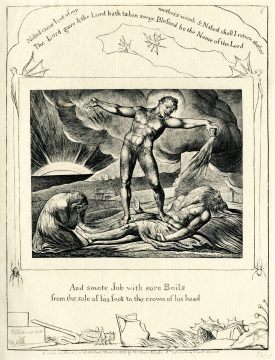Amitha Kalaichandran in The New York Times:
 I thought of the biblical story of Job last month when I was asked to speak to the National Partnership for Hospice Innovation. How would I counsel others to cope with losses so terrifying and unfair? How could those grieving find a sense of hope or meaning on the other side of that loss? In my research I found myself drawn to the powerful rendition of the Book of Job by the 18th-century British poet, artist and mystic William Blake, in particular his collection of 22 engravings, completed in 1823, that include beautiful calligraphy of biblical verses. Job, of course, is the Bible’s best-known sufferer. His bounty — home, children, livestock — is taken cruelly from him as a test of faith devised by Satan and carried out by God. He suffers both mental and physical illness; Satan covers him in painful boils.
I thought of the biblical story of Job last month when I was asked to speak to the National Partnership for Hospice Innovation. How would I counsel others to cope with losses so terrifying and unfair? How could those grieving find a sense of hope or meaning on the other side of that loss? In my research I found myself drawn to the powerful rendition of the Book of Job by the 18th-century British poet, artist and mystic William Blake, in particular his collection of 22 engravings, completed in 1823, that include beautiful calligraphy of biblical verses. Job, of course, is the Bible’s best-known sufferer. His bounty — home, children, livestock — is taken cruelly from him as a test of faith devised by Satan and carried out by God. He suffers both mental and physical illness; Satan covers him in painful boils.
Job is conflicted — at times he still has his faith and trusts in God’s wisdom, and other times he questions whether God is corrupt. Finally, he demands an explanation. God then allows Job to accompany him on a tour of the vast universe where it becomes clear that the universe in which he exists is more complex than the human mind could ever comprehend. Though Job still doesn’t have an explanation for his suffering, he has gained some peace; he’s humbled. Then God returns all that Job has lost. So, the story is, in large part, about the power of one man’s faith. But that’s not all.
…It’s also about our attachments — to our identities, our faith, the possessions and people we have in our lives. Grief is a symptom of letting go when we don’t want to. Understanding that attachment is the root of suffering — an idea also central to Buddhism — can give us a glimpse of what many of us might be feeling during this time.
More here.
